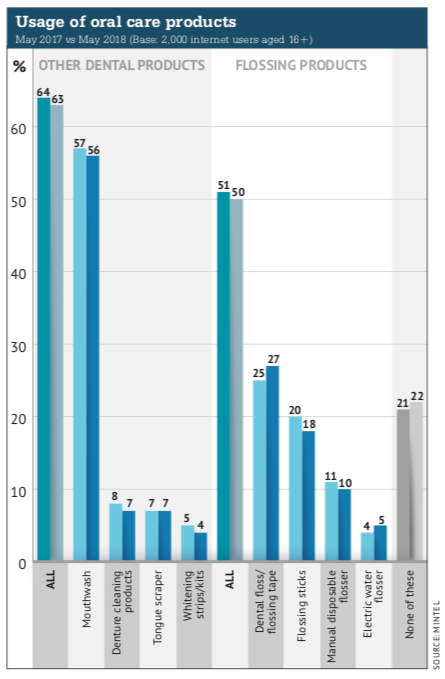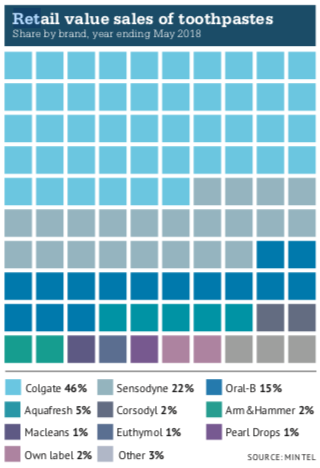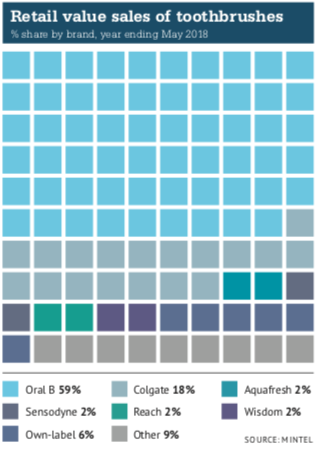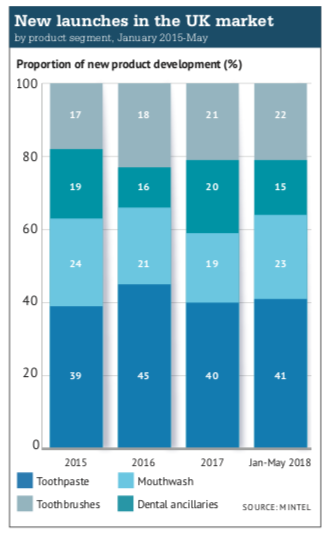OTC

Brush up on oral care
In OTC
Bookmark
Record learning outcomes
One in four adults don’t brush their teeth twice a day and less than a quarter floss regularly, according to the Oral Health Foundation. Some 31 per cent of us has decay and almost a third of us suffer with dental pain regularly. There is plenty pharmacy staff can do to help improve knowledge and education of good oral care, writes Sarah Purcell
“Being on the frontline of healthcare, you have a substantial role to play in improving the nation’s knowledge about oral health. A basic message to give your customers is to brush for two minutes twice a day using a fluoride paste,” says Dr Nigel Carter, chief executive of the Oral Health Foundation. “We need you to help educate members of the public so that they are more aware of the importance of good oral healthcare. This includes toothbrushing and daily oral hygiene advice, information about diet and the role of sugar in problems like tooth decay. Customers should understand that the health of their mouth is closely related to their overall wellbeing.”
The main problems you’re likely to see in the pharmacy, says Dr Carter, are toothache, sensitive teeth, cold sores, mouth ulcers and bad breath. “Due to an increase in prescriptions and medications, it’s likely there will be a growth in the number of people seeking advice on dry mouth.”
It's important to be aware of and understand the oral health needs of the local community and the wider heath picture. “Pharmacy teams should strive to know the oral health needs of individuals and the services and products available to help them maintain good oral hygiene,” says dentist and bacteriologist Dr Harold Katz.
“Gum disease affects three out of four adults over the age of 35 in the UK and incidence increases with age. Gum disease, not tooth decay, is the biggest cause of tooth loss and is caused by plaque. It has proven links to the likelihood of developing heart disease, cancer and most recently to dementia,” says Dr Katz. “Poor oral hygiene is the most common cause of gum disease, and if the disease isn’t in advanced stages then good oral hygiene habits can reverse it.”

“To prevent and treat gum disease, customers need to ensure they remove all the plaque from their teeth every day, by brushing and cleaning between teeth,” says Dr Carter. Regular use of mouth wash can also help, as will lifestyle changes such as limiting consumption of sugary foods and drinks, quitting smoking and keeping well hydrated.
Diabetes is strongly linked with increased risk of gum disease (by up to three times) and the rise in diabetes means the problem is likely to increase. “People who don’t know they have diabetes, or whose diabetes is not under control, are especially at risk. It is important that anyone with diabetes gets gum disease diagnosed early. This is because it can increase their blood sugar level, which would put them at risk of complications,” says Dr Carter.
New research has also linked diabetes in women with increased risk of oral cancer. Overall, women face a 27 per cent increase of any form of cancer and a 13 per cent increased risk of mouth cancer if they have diabetes.
Treating bad breath
Bad breath affects one in four of us in Britain. “It is the result of billions of bad breath related bacteria eating left over proteins in the mouth and converting them to smelly, sulphur-based waste,” explains Dr Katz. And while poor oral hygiene is a common factor, it’s not the only cause. “Anyone can get bad breath. Common causes tend to be dry mouth, eating certain foods (eg onions, garlic, curry) and disease.”
Staying hydrated is an essential piece of advice to pass on to customers. “Dehydration can cause halitosis because bacteria that live in the mouth tend to multiply as the mouth dries out. Dehydration causes a decrease in the production of saliva which fights many of these bacteria. Drinking also helps rinse the mouth of food particles in between brushings,” says Dr Katz.
Dr Katz’s top tips for treating halitosis
Go easy on mints and gum. They may be a short term fix, but if they contain sugar they may eventually worsen the situation as they can lead to an accumulation of plaque.
Encourage regular brushing and flossing
Recommend an alcohol-free mouth wash to be used daily.
When deciding which types of oral care products to stock, you may consider whether to try to compete with supermarkets on basic products or to concentrate more on niche items.
“As an independent pharmacy, I think it’s important to compete with supermarkets on basic oral health products such as brushes and pastes. However, we should prioritise oral health care over cosmetic products as our aim is to treat our customers and help prevent oral health problems,” says Alphega member Samina Khan, owner of Pateley Bridge pharmacy Yorkshire.
At Numark, Lucy Morris, service development pharmacist, says: “Healthcare is the core focus in pharmacy so should take priority. Advice and support are the points of difference which draw your customers. Oral health offers products with P medicines, which sets us apart from supermarkets and discount stores. Specialised oral hygiene products will encourage a conversation between counter staff and customers, which can increase loyalty and that one to one contact you don’t get in a supermarket.”
Samina Khan says mouthwashes sell well. “Especially the Corsodyl brand, which is recommended by dentists for bleeding gums. Others that sell well include Peroxyl and Fluoriguard. We also sell a lot of toothache relief products, especially Orajel.”

Lucy Morris says that oral hygiene is an important category, taking around seven per cent of pharmacy share space. “Within oral hygiene, the core subcategory is toothpaste, while in oral health, it is ulcer relief and cold sore relief products. Denture care also holds a large portion of space in independent pharmacy. A selection of fixatives and cleansers will help you cater for these customers, positioned towards the middle of the fixture for ease of access.”
Sadik Al Hassan, pharmacist at Well, says: “Dry mouth is a more common problem than ever. Biotene products such as their Oral Balance gel are very popular and sprays such as Glandosane with tablets and lozenges less popular. The last few years has seen the rise of CB12 in the battle against bad breath. I’m also seeing customers pick enamel protective pastes such as Sensodyne Pronamel and Oral B Pro Expert over value products.”
Trends in oral care
“There is much focus from the leading brands now on whitening, sensitivity and gum disease. Knowledge of gum disease is increasing with a lot of brand presence on TV. Pharmacies need to be equipped with the right knowledge and product range to support customers to maintain healthy gums and understand when to refer,” says Cathy Crossthwaite, marketing co-ordinator at Numark.
Interdental brushes are a growing sector and have recently overtaken floss as our favourite way to clean between teeth. A poll by the Oral Health Foundation found over a third of Britons choose interdental brushes (34 per cent) rather than floss (31 per cent). Other methods include tape (17 per cent), floss harps (12 per cent) and waterjet sprays (seven per cent). Some 62 per cent of people now clean between teeth regularly.
New research has found that the best way to clean teeth is to do interdental cleaning before traditional brushing. This is because interdental brushes or floss loosen bacteria/debris between teeth, which allows brushing to be more successful at removing plaque.
Electric brushes continue to grow, say market researcher Mintel, with 37 per cent of us having used a standard rechargeable brush and 15 per cent a battery-operated brush last year.
 Despite falls in value sales of mouthwash, usage has increase, with 74 per cent of users using it at least once a day, say Mintel.
Despite falls in value sales of mouthwash, usage has increase, with 74 per cent of users using it at least once a day, say Mintel.
Whitening products continue to be popular, with whitening pastes and mouthwashes seeing more growth than kits. Almost half of us have tried a whitening paste.
Overall, new product development in the oral care market has increased sharply since 2015. “Smaller brands have made an effort to tap into the market, with the ancillaries segment being a particular focus. There is still potential for growth in this less mature category, particularly if brands can embed flossing into the daily oral care routines of consumers. Flossing and other interdental products made up two-thirds of NPD,” say Mintel.
Innovation last year included the launch of on-the-go mouth sachets – Ultradex One Go. There was a rise in alternative product launches, including fresh breath spray Optima AloeDent Fresh Breath Therapy and Dr Tung’s Smart Floss. Some 38 per cent of adults are interested in natural oral care products.
Toothpaste was the only sector to show growth in 2018, say Mintel, while mouthwash dropped by 6 per cent. Most of the current innovations are changes to existing ranges, say Mintel, which encourages customers to focus on product pricing.
Oral health campaigns for 2019
| Campaign | Date | What is it for? | Website |
| National Toothache Day | 9 February | A good chance to talk about decay and importance of diet | |
| World Oral Health Day | March 20 | The theme is 'Act on Mouth Health' | worldoralhealthday.org |
| National Smile Month | Mid May to mid-June | Largest oral health campaign, run by Oral Health Foundation | dentalhealth.org/what-is-national-smile-month |
| World Diabetes Day | November 14 | You can tie in with oral health and talk to customers about links between diabetes and gum disease | diabetes.org.uk/get_involved/world-diabetes-day |
| Mouth Cancer Action Month | November | This aims to raise awareness of mouth cancer causes and signs | dentalhealth.org/mouth-cancer-action-month |
Build a better oral care category
- “Merchandising is really important with helping customers navigate the category. Important things to consider are product adjacencies – think about link sales; who is the customer and what are they searching for? Use of beacon branding to help with locating and navigating the category – customers will search using visual cues and triggers. Choose your stock wisely. A common problem with oral hygiene in pharmacy is more products than necessary. Less is more. Focus on specific conditions/requirements from leading brands,” says Cathy Crossthwaite.
- “Keep a good selection of oral health products for all age groups. Both manual and electric brushes should be stocked as well as interdental ranges. Also keep a good range of denture care products such as Fixodent,” says Samina Khan.
- “Running your pharmacy healthy living campaign on an oral health topic is a great way to not only help your patients receive the help they need, but boost awareness of the products you have available,” says Sadik Al Hassan.
- “Ensure counter staff have the right knowledge to support customers with general oral health queries such as ulcer relief, cold sore relief, toothache and general hygiene,” says Lucy Morris.

